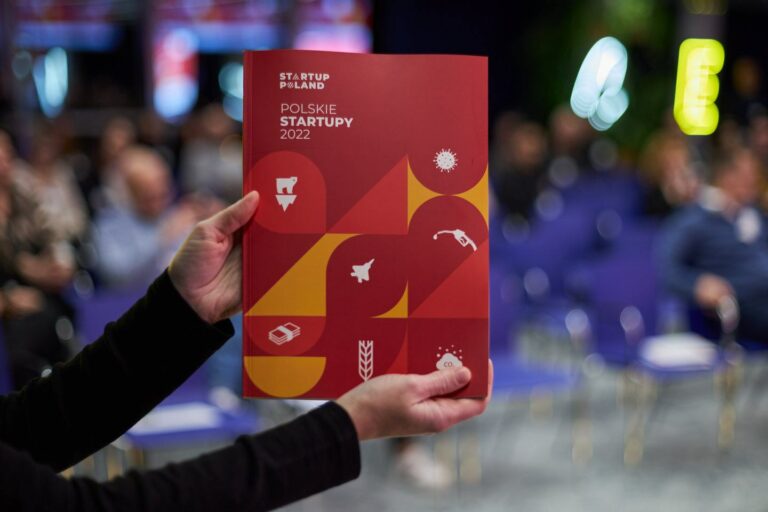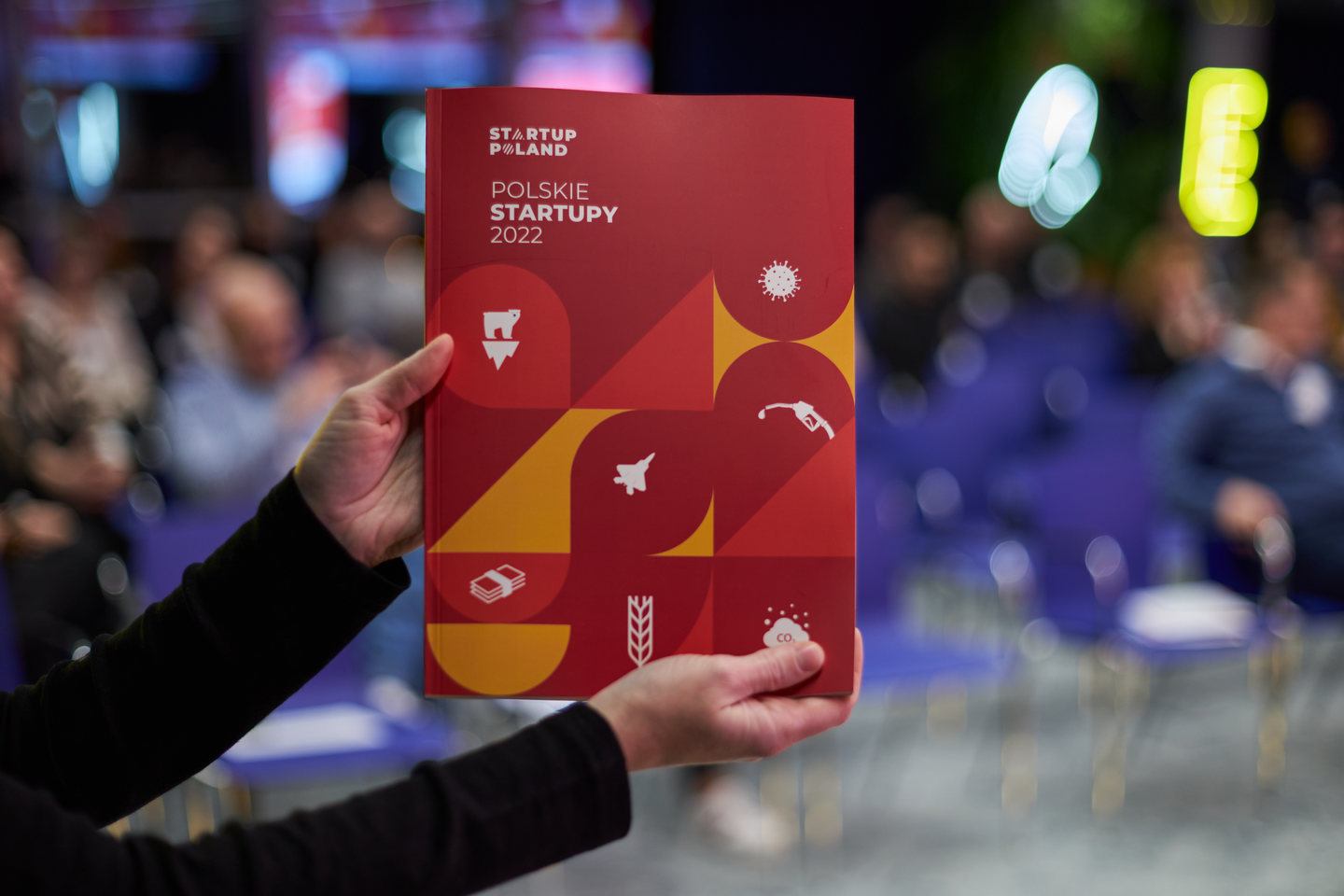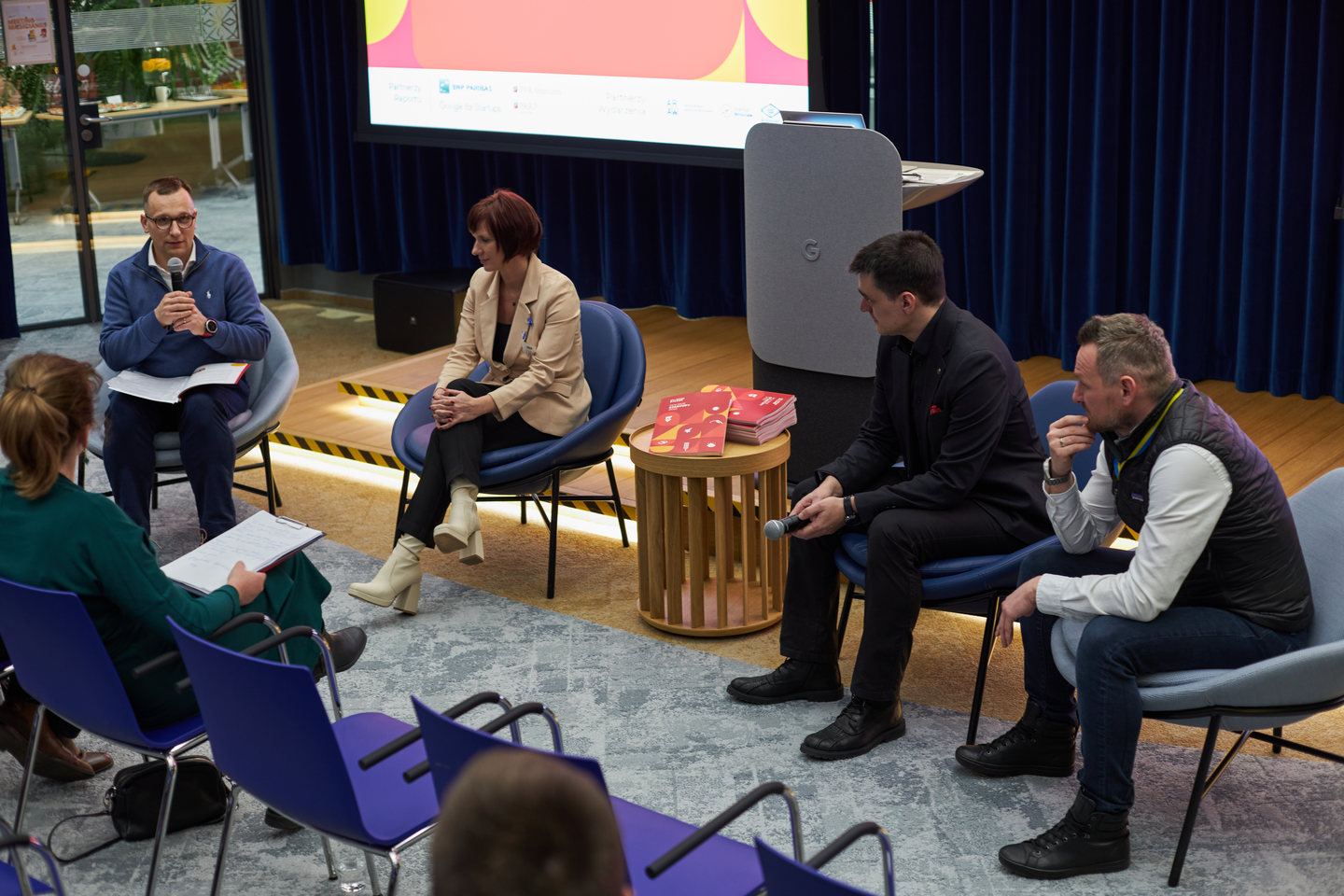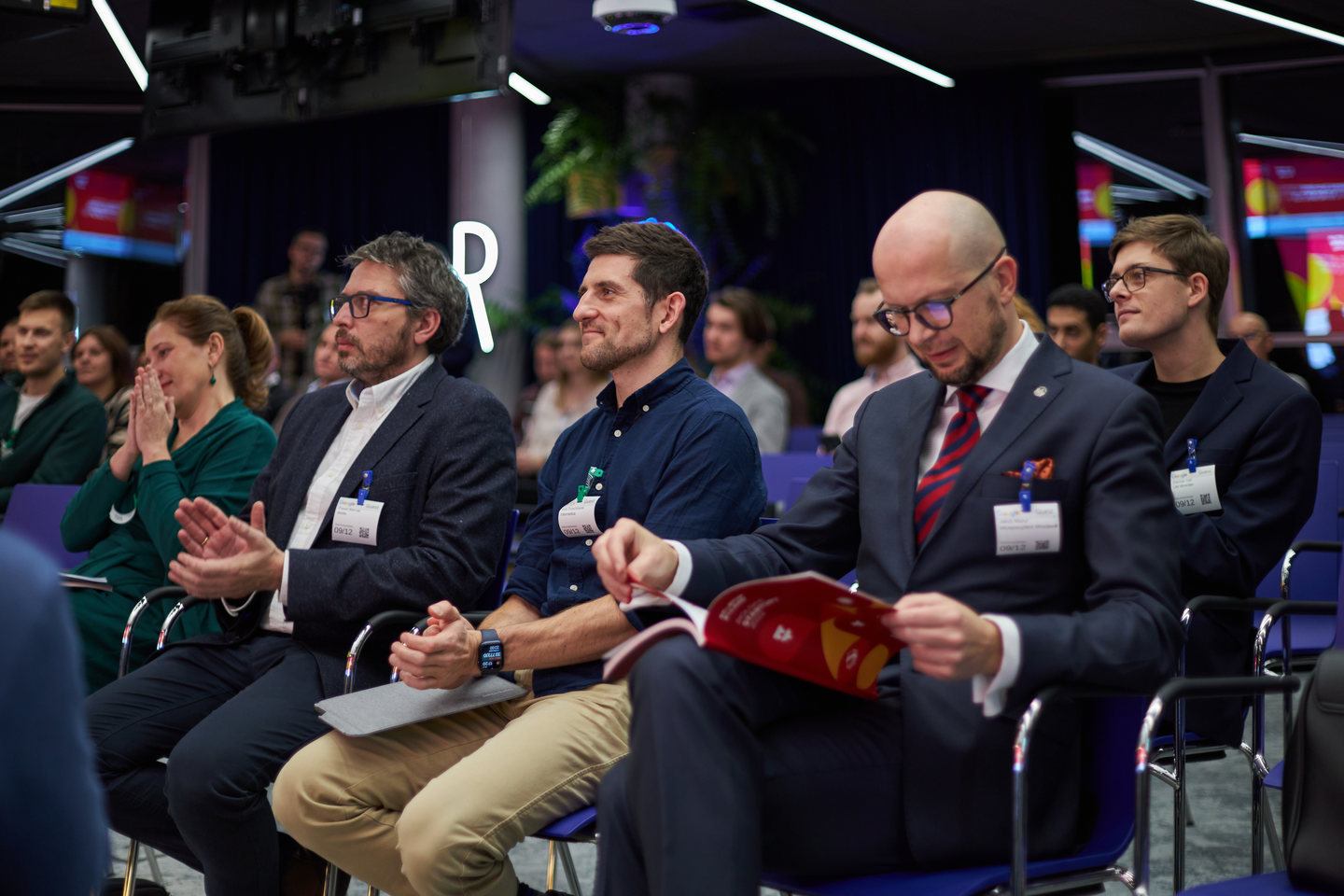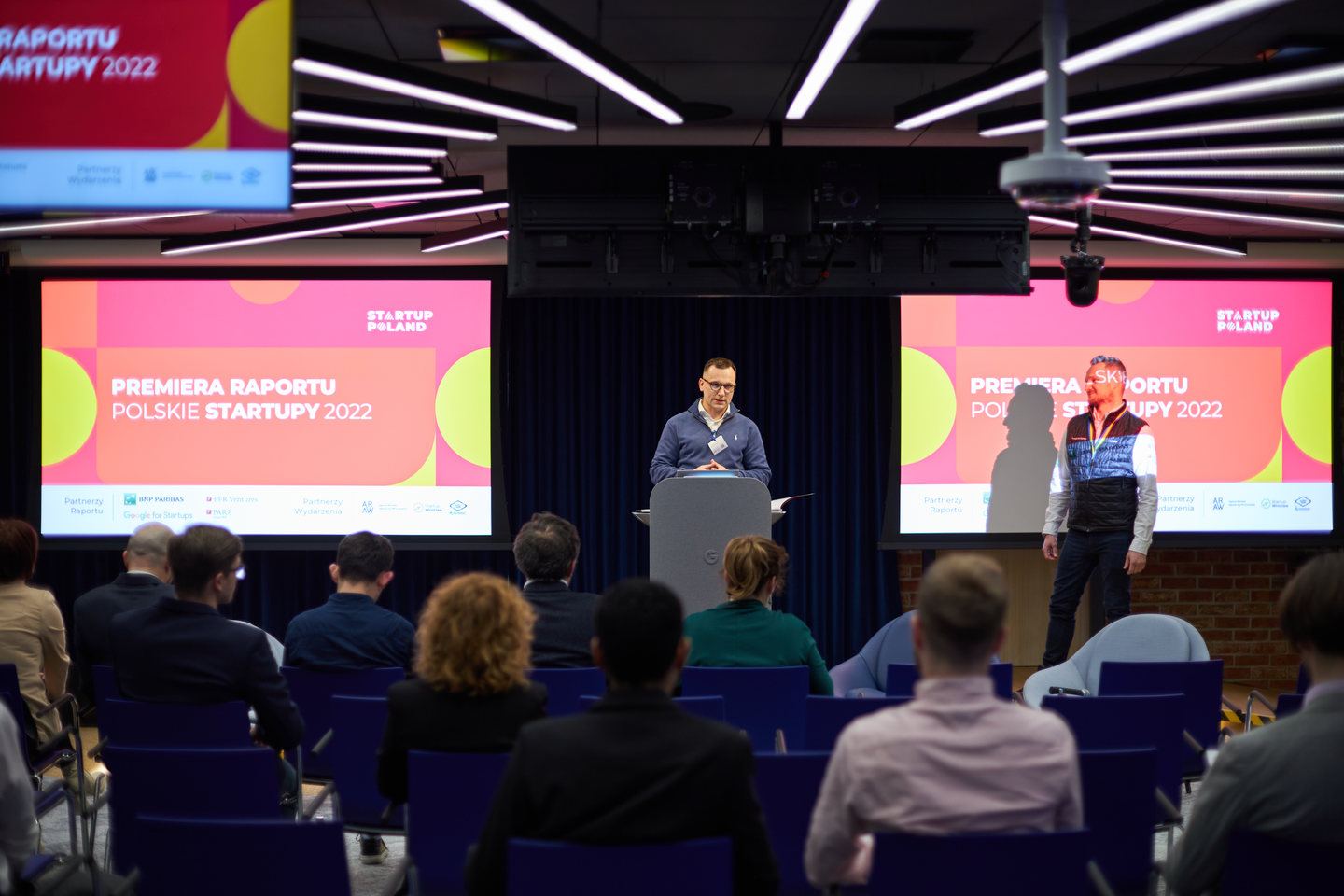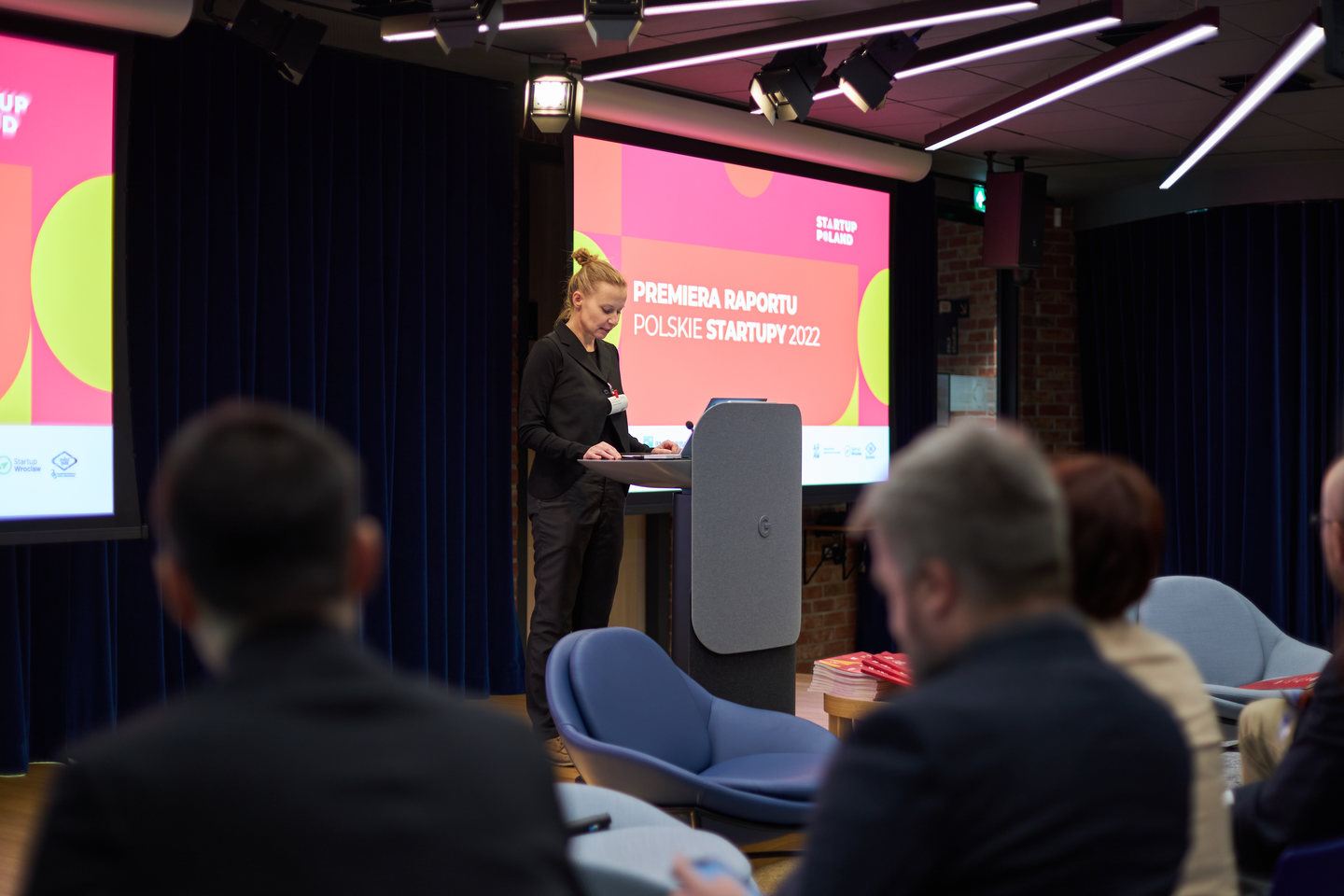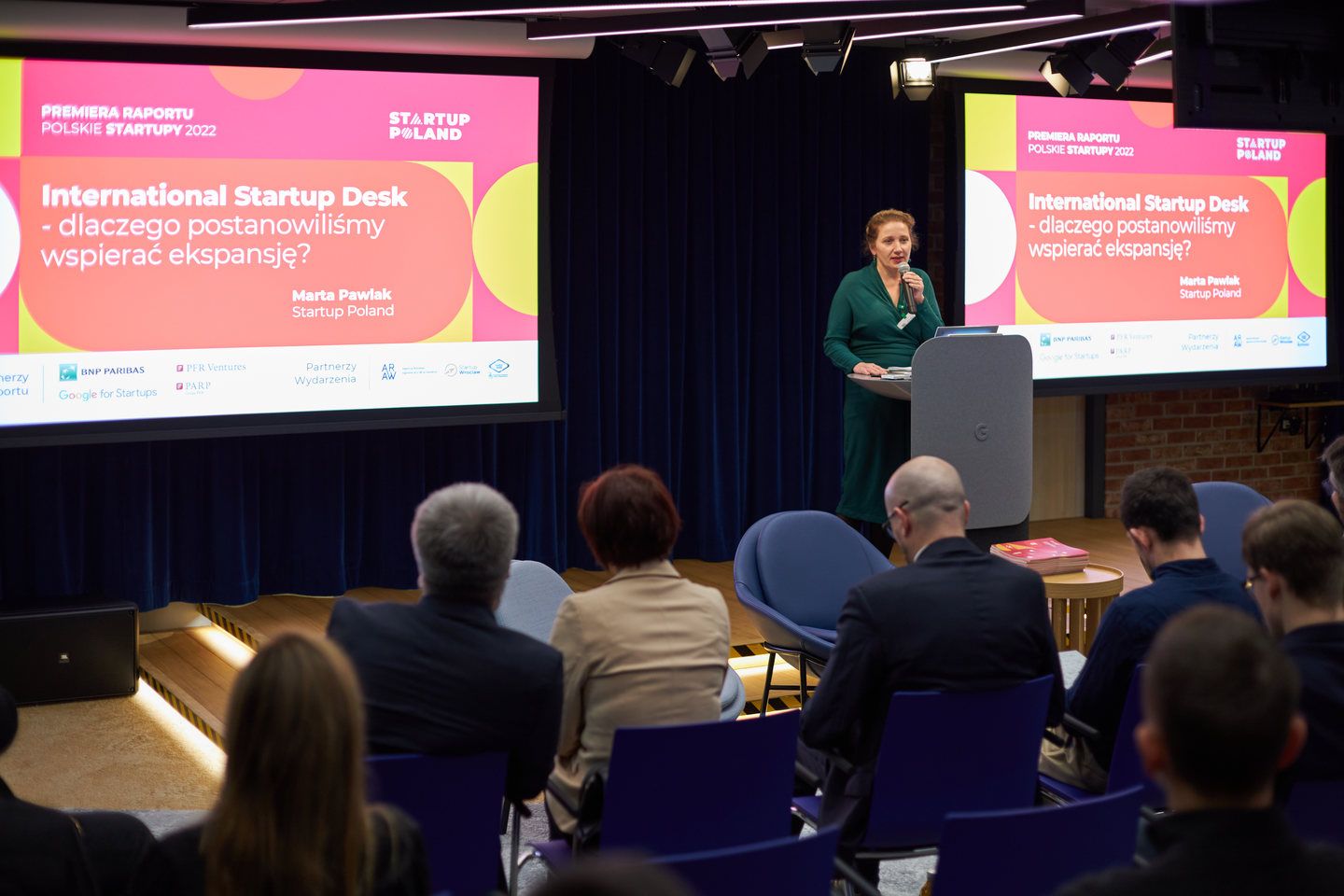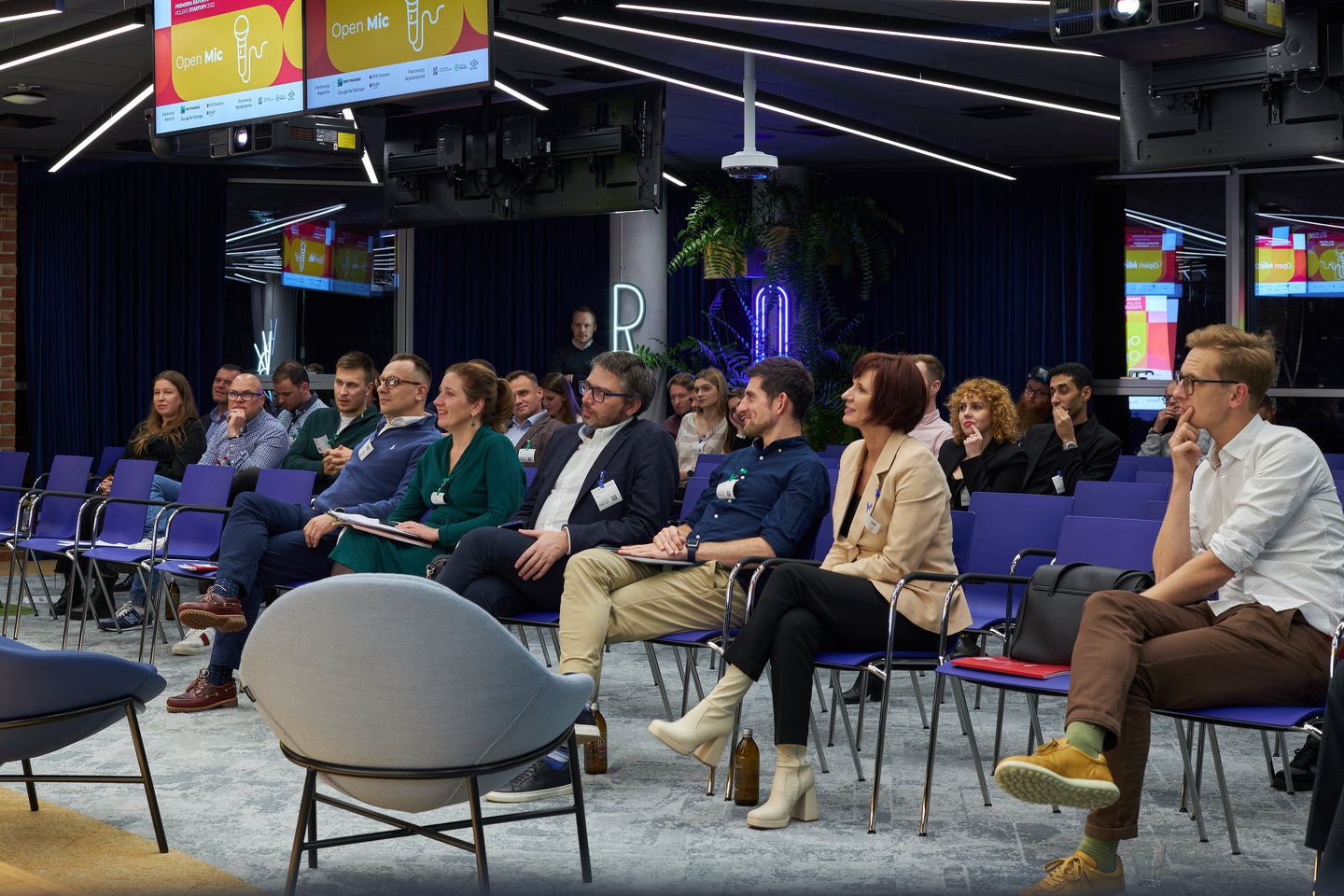W piątek, 9 grudnia br., w siedzibie Google we Wrocławiu zaprezentowano najbardziej wyczekiwaną publikację polskiej branży startupowej, czyli najnowszy raport „Polskie Startupy 2022”. Organizatorzy spotkania miejsce wybrali nieprzypadkowo. Wrocław i Dolny Śląsk mają w tym roku szczególne powody do zadowolenia, bo właśnie tutaj zarejestrowanych jest najwięcej technologicznych spółek w Polsce.
“Wrocław od lat pracuje na miano startupowej stolicy Polski. Kolejne edycje naszego raportu „Polskie Startupy” wskazują, że ekosystem startupowy ma się tu bardzo dobrze – województwo dolnośląskie przoduje, jeśli chodzi o liczbę innowacyjnych spółek. Jest też najświeższy ranking Dealroom.co – autorzy przeanalizowali 201 miast z 65 krajów i wyłonili te, w których innowacje rozwijają się najsprawniej. Wrocław zajął ósme miejsce w kategorii „Wschodzące Gwiazdy” i to przed Warszawą, która wylądowała na jedenastym. Niech premiera ósmej już edycji „Polskich Startupów” – którą organizujemy po raz pierwszy we Wrocławiu, a nie jak dotychczas w Warszawie – będzie kolejnym dowodem na to, że startupy czują się we Wrocławiu dobrze.”
– Tomasz Snażyk, prezes Startup Poland.
“Z raportu wynika, że Wrocław i region dolnośląski wyprzedzają stolicę i Mazowsze. Nie chodzi o to, kto jest pierwszy a kto ostatni. Ważne jest, że Wrocław sukcesywnie utrwala swoją silną pozycję lidera w całym ekosystemie startupowym. Lidera budującego innowacyjne społeczeństwo w gospodarce czy kulturze. To powoduje dopływ różnych źródeł finansowania a tym samym pracy.”
– Jakub Mazur, wiceprezydent Wrocławia.
Wysoką pozycję Wrocławia w ekosystemie startupowym potwierdza jeszcze jeden najnowszy ranking. Wrocław znalazł się na czele polskich miast w kategorii wschodzących gwiazd hubów technologicznych w opublikowanym właśnie raporcie „The next generation of tech ecosystems” przygotowanym przez Dealroom. Stolica Dolnego Śląska zajęła w tej kategorii drugie miejsce w Europie oraz ósme na świecie, co jednoznacznie wskazuje, że jest to doskonałe miejsce do zakładania startupów i rozwoju innowacji.
“To potwierdza, że możemy czuć się liderem i pokazuje, że Polska jako miejsce rozwoju startupów jest coraz bardziej zauważana. Jest to niezwykle ważne szczególnie teraz, gdy inwestorzy dość ostrożnie inwestują w startupy. Szczególnie widzimy to patrząc na zahamowanie funduszy dla startupów na rynku amerykańskim. W Polsce jeszcze ten rynek jest stabilny.”
– Magdalena Okulowska, prezes zarządu Agencji Rozwoju Aglomeracji Wrocławskiej S.A
Wrocław startupową stolicą Polski. Raport Fundacji Startup Poland
Mapa polskich startupów, finansowanie, inwestycje, konsekwencje globalnych kryzysów i ekspansja zagraniczna – na te i inne pytania odpowiada tegoroczna edycja cyklicznego raportu Fundacji Startup Poland – „Polskie Startupy 2022”.
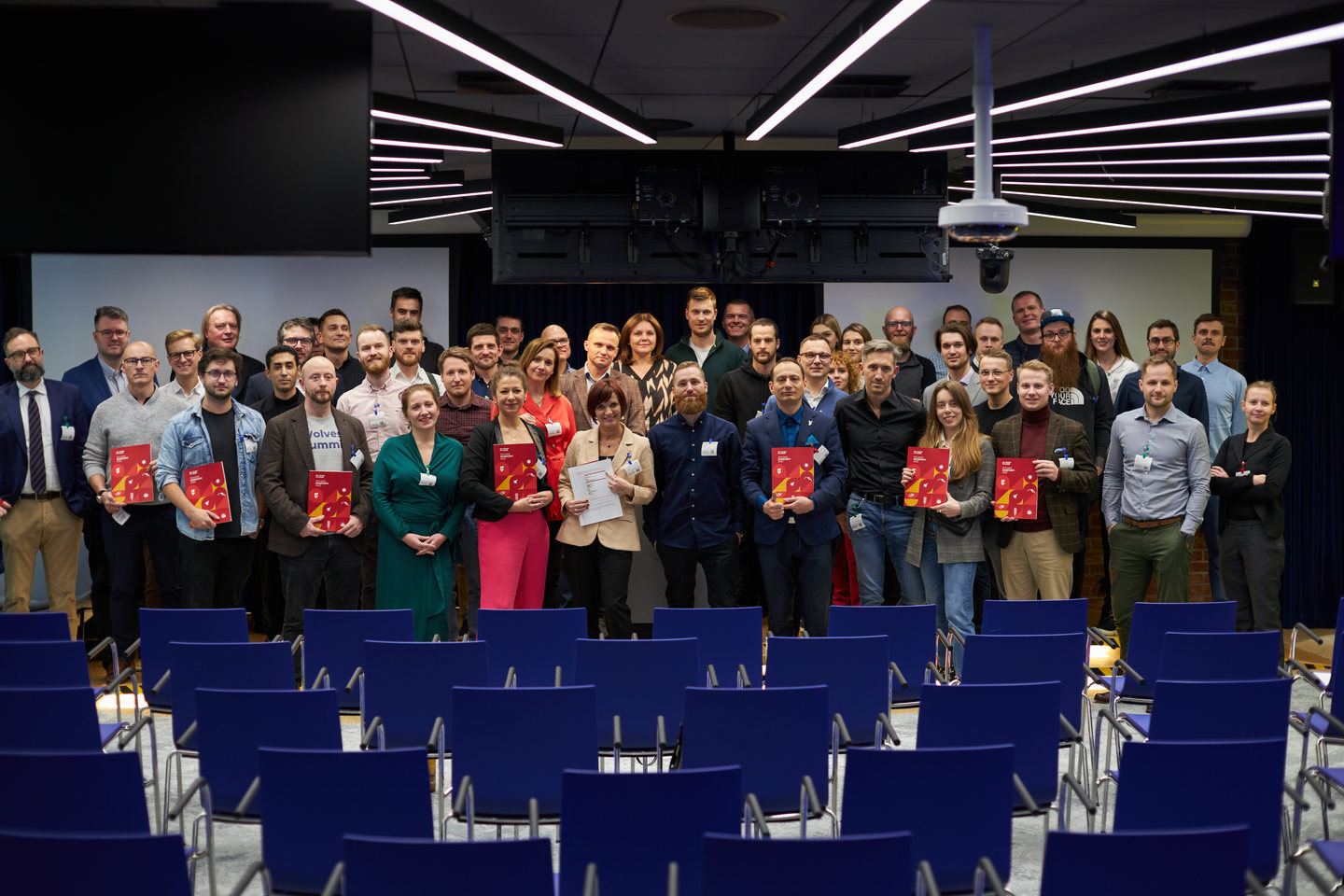
Polskie Startupy 2022 Premiera
Tomasz Snażyk, prezes Fundacji Startup Poland podkreśla, że najnowsza, ósma już, edycja raportu jest kolejną, która powstaje w momencie kryzysu, a raczej kilku równocześnie występujących kryzysów.
Magdalena Okulowska, prezes zarządu Agencji Rozwoju Aglomeracji Wrocławskiej S.A. zwraca uwagę, że polski ekosystem w większości nie ocenia jednak ostatnich lat negatywnie, a potencjał drzemiący w startupach, ich elastyczność oraz kreatywność, doprowadziły nie tylko do pozyskania nowych odbiorców i zauważalnego wzrostu sprzedaży, ale co ważne – również utrzymania zatrudnionej kadry.
“W wielu branżach związanych z cyfryzacją produktów, e-commerce oraz ochroną zdrowia, pojawiło się sporo interesujących projektów, a rynek startupów technologicznych zdecydowanie się powiększył. Rentowność biznesów w stosunku do ich innowacyjności była na drugim planie, co odzwierciedla wiele spektakularnych i rekordowych transakcji VC. Przykładem pozytywnego wykorzystania kryzysu są znane wrocławskie spółki: Infermedica, Alphamoon, Bioceltix, CUX, PayEye, Brand24, Biotts, Vue Storefront czy SatRev.”– dodaje Magdalena Okulowska.
Michał Kramarz, dyrektor Google for Startups w Europie Środkowo-Wschodnie oceniając minione miesiące podkreśla, że to był wymagający rok.
“Wojna w Ukrainie i sytuacja gospodarcza nie sprzyja temu, by kapitał był coraz tańszy i jego pozyskiwanie było coraz łatwiejsze. Więc to był rok wymagający przemyślenia zarówno podejścia do biznesu, inwestowania jak i rozwijania firmy. Z drugiej strony myślę, że przymusi to założycieli startupów do tego żeby pracować nad jeszcze większą efektywnością.”
– Michał Kramarz, dyrektor Google for Startups w Europie Środkowo-Wschodnie
Czytaj także: Prezentujemy TOP 10 wrocławskich startupów. To tylko wierzchołek góry wrocławskiego ekosystemu startupowego. Wytypowaliśmy tych przedstawicieli ze względu na ogromną innowacyjność oraz dużą już rozpoznawalność w Europie i na świecie.
Startupy stawiają na Dolny Śląsk i Wrocław – tu jest polska Dolina Krzemowa
W raporcie znajdziemy odpowiedź na pytanie, który region Polski można określić „polską Doliną Krzemową”. Na czoło wychodzą zdecydowanie dwa województwa, jeśli chodzi o liczbę zarejestrowanych startupów – najwięcej (21 proc.) jest w woj. dolnośląskim, a drugie miejsce zajmuje Mazowsze. Zatem Wrocław i Warszawa to dwa główne ośrodki wybierane przez rodzime startupy. Trzecie miejsce zajmuje woj. małopolskie (Kraków) – został tam zarejestrowany co dziesiąty pytany podmiot. Awans Wrocławia na startupowej mapie Polski jest znaczący. W ubiegłym roku mazowieckie miało 32 proc. a dolnośląskie 9 proc.
Mapa polskich startupów. Domena 30-latków
Struktura rynku polskich startupów nie zmienia się znacząco z roku na rok. Nadal większość z nich to firmy młode, zazwyczaj z krótszym niż czteroletni stażem. Niemal co trzeci działa od 3 do 4 lat, podobny odsetek funkcjonuje od roku lub dwóch lat, a co piąty pytany startup nie ma jeszcze rocznego stażu (22 proc.). Spółek zakładanych jako startupy, ale z dłuższą już historią jest stosunkowo niewiele – co dziesiąta ma od 5 do 10 lat, a działalnością trwającą dłużej niż dekada może się pochwalić 7 proc. badanych firm.
O ile ubiegłoroczne badanie pokazało, że zwiększyła się nieco liczba startupów zakładanych przez osoby młodsze (przez 20-latków), to jego najnowsza odsłona potwierdza tendencję zauważalną już w latach wcześniejszych – zakładanie startupu to najczęściej domena 30-latków.
W czym są najlepsze nasze startupy
Autorzy raportu podkreślają, że poproszone o wskazanie trzech słów kluczowych najlepiej oddających charakter głównej usługi lub oferowanego produktu startupy najczęściej wymieniały: AI i machine learning (21 proc.), produktywność i zarządzanie (14 proc.), analitykę – research tools, business intelligence (13 proc.), HRtech i HR tools, medtech (w obu przypadkach po 12 proc.), usługi finansowe – fintech lub insurtech oraz big data (10 proc.)
Polskie startupy najczęściej działają w modelu B2B enterprise (39 proc.), a kolejne 25 proc. wskazuje na B2B small business. W sumie w modelu B2B funkcjonuje zatem niemal dwie trzecie krajowych startupów. Znacząco mniej – bo już tylko 11 proc. działa w formule direct to consumer (B2C).
Niemal dwie trzecie startupów jako grupę docelową dla swoich usług wskazywało na B2B – firmy małe i średnie (do 250 zatrudnionych), a kolejne 62 proc. na firmy duże i korporacje zatrudniające powyżej 250 osób. Klienci indywidualni (B2C) są grupą docelową dla 35 proc. startupów. Nieco mniej (30 proc.) kieruje swoją ofertę do klientów instytucjonalnych (B2G) – urzędów, samorządów, szkół, uczelni, szpitali, służb etc.
Źródła finansowania startupów
Jedynie 7 proc. startupów odczuło w momencie badania spadek zainteresowania inwestorów zagranicznych. Znacznie większa część (38 proc.) takiego negatywnego trendu dotychczas nie odczuła. Więcej niż co drugi startup udziela jednak odpowiedzi „trudno powiedzieć”.
Wśród startupów zapytanych o to, z jakich źródeł kapitału mieli okazję skorzystać, najwięcej, bo aż 68 proc. wskazuje na bootstrapping, czyli środki własne. Kluczową rolę na polskim rynku odgrywają krajowe fundusze VC, z których kapitału skorzystało 28 proc. badanych startupów, a także rodzimi aniołowie biznesu, którzy wsparli co piąty startup (22 proc.). Identyczny odsetek wskazał na finansowanie pozyskane z Narodowego Centrum Badań i Rozwoju.
Co hamuje rynek startupów w Polsce?
Główną barierą dla rozwoju startupów w Polsce są problemy z pozyskaniem pracowników, przy jednoczesnym szybkim wzroście kosztów ich zatrudnienia. Na ten aspekt zwraca uwagę aż 52 proc. startupów. Drugą barierą, z którą najczęściej mierzą się polskie startupy, są trudności z pozyskaniem finansowania w kolejnych fazach rozwoju. Takiej odpowiedzi udzieliło 42 proc. pytanych. Niespełna 30 proc. startupów narzeka na zbyt dużą biurokrację przy prowadzeniu działalności operacyjnej.
Czarne łabędzie – konsekwencje globalnych kryzysów
W obliczu ostatnich kryzysów (czarnych łabędzi) blisko połowa polskich startupów (49 proc.) deklaruje, że koszty prowadzenia działalności wzrosły w sposób znaczący. Tych, którzy nie odnotowali wzrostu kosztów, jest 50 proc. Z kolei startupów, w których koszty uległy zmniejszeniu, jest śladowa ilość (tylko 1 proc. wskazań). Najczęściej wybieraną taktyką walki z rosnącymi kosztami działalności jest podniesienie cen oferowanych produktów lub usług. Taki ruch wykonało aż 37 proc. startupów. Drugim najczęstszym sposobem radzenia sobie ze wzrostem kosztów prowadzenia działalności przez startupy jest zmniejszenie budżetów na reklamę i marketing. Niemal co piąty badany startup był zmuszony do przeprowadzenia zwolnień (19 proc.)
Ekspansja zagraniczna
Z raportu wynika, że w ubiegłym roku aż 78 proc. founderów planowało wejść ze swoim biznesem na zagraniczne rynki w ciągu kolejnych 12 miesięcy. Blisko połowa krajowych startupów rozważa przeniesienie swojego biznesu na stałe poza Polskę, co oznaczałoby również wyprowadzkę siedziby do innego kraju. Zdecydowana większość planuje przenieść firmę do innego kraju ze względów stricte biznesowych. Drugą najczęściej wskazywaną przyczyną są trudności związane z wprowadzonym przez rząd, a następnie wielokrotnie zmienianym Polskim Ładem.



